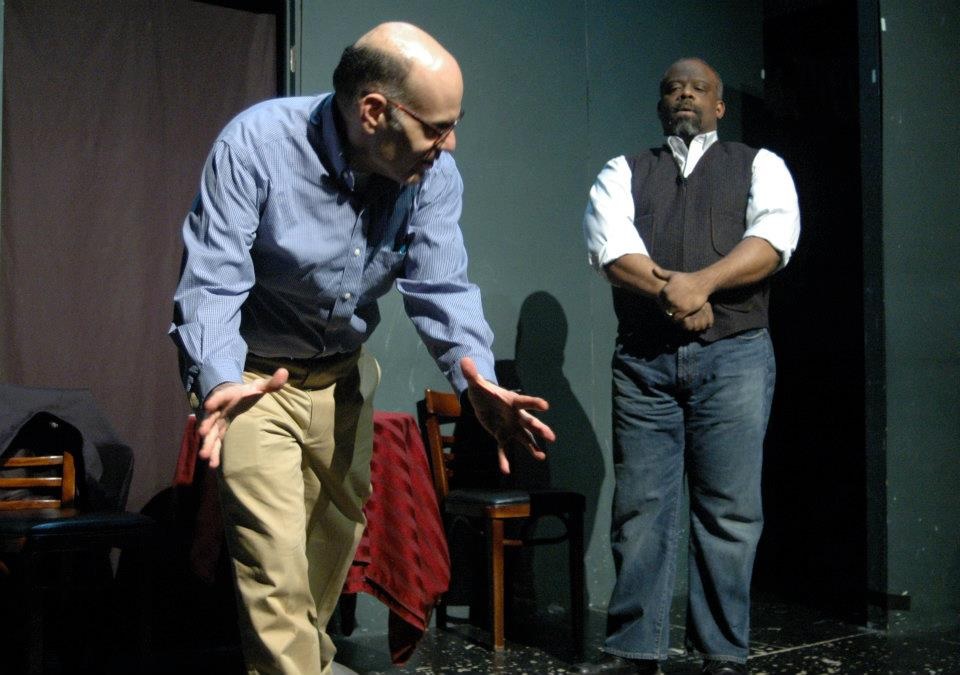How to Keep Challenging Yourself on Stage

If you've been in an improv group for a while, you’ve most likely hit a consistency level with your shows. This is a good thing. But it can also be a trap.
When some groups get to the point where they’re consistently doing good shows, they’re usually happy with this and seem to go on auto pilot. The shows slowly became rote because the players would rather do what they know will get a laugh than challenge themselves.
They have forgotten what attracted them to improv in the first place: “the rush.” The rush of taking risks in front of complete strangers, the thrill of knowing that it could succeed or fail miserably at any moment. If you haven’t felt that feeling in a while, it’s time to challenge yourself.
That’s what I love about playing with Jimmy and Johnnie, a three-person show that I do once a month with John Hildreth, who is a wonderful improviser and teacher, and a special guest. Before each show, we talk briefly about one thing we want to do differently in the show to challenge ourselves. It’s simple, but I’ve found it to be really effective.
In out last show, our special guest was Dee Ryan, who I love playing with, and we decided to throw out our usual way that we start each show, which is by doing a three-person scene that we are all matching energies in, and instead do a series of short, two-person scenes until we hit a crescendo and then do a three-person scene. The show was a blast because changing things up forced us to discover new territory as a group, which is exciting. It gave the show a different energy, and we achieved the Holy Grail for improvisers, which is “the rush.”
When we hit complacency, we are dead as improvisers, artists and people. To get the rush back, you have to constantly expand your comfort zone on stage.
Here are three tips for how to keep challenging yourself on stage:
- Come Up With Something The Entire Group Can Achieve
If you’re going to suggest something for your group to work on before a show, make sure it’s something the entire group can do. For example, saying "Let’s do more characters,” is not a very effective goal because essentially it’s up to each person to play more characters, and it's hard for the group to hold people accountable to that. Instead, come up with something to change about the show itself.So if you are doing Harolds, you could say, “No one can enter for the first three beats,” or “Let’s edit our scene early.” This is something you can all do as a group and can be easily measured. - Keep It Simple
The other thing to remember is you are doing this to enhance a show that is already running, not replace it. Some eager improvisers will get on their high improv horse before a show and say, "I am tired of doing the Harold. Let’s do an Armando tonight." Unless it’s agreed upon beforehand, I don't recommend making a change that’s this drastic. - Make Sure You’re Consistently Good Before You Make Changes
Also, before you decide to change things up, make sure the group has done a number of consistently good scenes. That is your foundation, and without it, you cannot build a sturdy improv house. Sometimes impatient improvisers will want to make changes because they are bored, usually adding bells and whistles when it’s the scene work that need to be addressed.
For me, challenging myself and forcing myself to get out of my comfort zone is just a way to keep learning. The best players in improv never stop learning or challenging themselves, and I hope this is you.


I know exactly what you mean about finding way to challenge yourself. Because we are a two person group who does an improvised cop drama each show it can be easy to formula. I don't however like to discuss what we will do different before a show for risk of forcing things too much. Instead each of us will come up with new things as we go and trust the other will follow. It usually works and if it doesn't we have learned something in the process. We also do videos occasionally an d i have found this a good source for finding different ways to approach things and doing transitions. That I can then go back and apply to the improv.